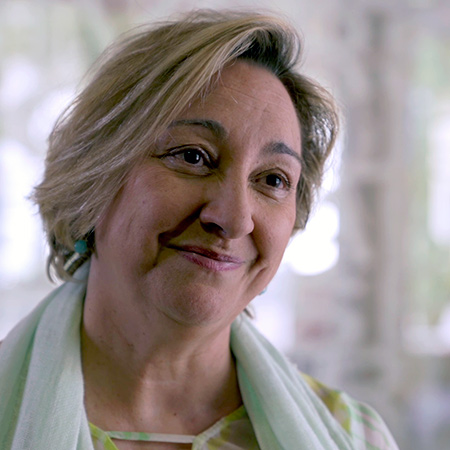ÁNGELA NIETO TOLEDANO
ÁNGELA NIETO TOLEDANO

Working at:
ERC project: “EMTASY”
Research on genes that cause cellular movement making it possible to form beings. This refers to snail family genes, whose function is to allow the epithelial cells of embryos to migrate and be positioned in the right places to form the different organs of each being.
Bio
I went to the Tirso de Molina school right to the Segovia bridge and I took my Baccalaureate at the Isabel La Católica High School in the Retiro area of Madrid. I went on to study Biological Sciences, I graduated and took my PhD at the Autonomous University (UAM), all in Madrid.
My first post-doc post was at the CSIC and UAM Biomedical Research Institute, also in Madrid, followed by a post at the Max Planck Institute of Psychiatry in Munich and four years at the National Institute for Medical Research in London. I returned to Spain in 1993 after securing a tenured scientist position at the Cajal Institute and in 2004, I moved with my whole group to Alicante, to the CSIC Institute of Neurosciences and the Universidad Miguel Hernández. We drove in convey including a refrigerated truck at 4ºC, another at -20ºC and another at room temperature containing microscopes and other materials. The experimental animals had already been moved according to regulations. We followed on behind in our cars, all in a line. We set up the first experiment within 36 hours of arriving.
I only ever remember wanting to be a scientist. I was more interested in my chemistry set than my dolls. We have no family history of working in research, but my father is doubtlessly responsible for my fascination with the emerging properties of my chemistry set mixtures. There was something mysterious and seductive in the phrase that I read in the issues of ‘Research and Science’ that he occasionally brought home for me: “We continue moving forward in the fields of knowledge.” Then came a Baccalaureate Biology teacher who convinced me that is was a privilege to find out something new. My family has also been decisive, setting a lasting example in terms of hard work, effort and responsibility, particularly during tough times. I consider myself lucky to have a family like that, my partner and my friends and colleagues that help me (and allow me) to enjoy this work so much. I intend to never lose sight of this fascination and passion even when, as we’ve said so many times, a job takes more sweat than inspiration.
More about Ángela nieto Toledano

Working at:
Bio
I went to the Tirso de Molina school right to the Segovia bridge and I took my Baccalaureate at the Isabel La Católica High School in the Retiro area of Madrid. I went on to study Biological Sciences, I graduated and took my PhD at the Autonomous University (UAM), all in Madrid.
My first post-doc post was at the CSIC and UAM Biomedical Research Institute, also in Madrid, followed by a post at the Max Planck Institute of Psychiatry in Munich and four years at the National Institute for Medical Research in London. I returned to Spain in 1993 after securing a tenured scientist position at the Cajal Institute and in 2004, I moved with my whole group to Alicante, to the CSIC Institute of Neurosciences and the Universidad Miguel Hernández. We drove in convey including a refrigerated truck at 4ºC, another at -20ºC and another at room temperature containing microscopes and other materials. The experimental animals had already been moved according to regulations. We followed on behind in our cars, all in a line. We set up the first experiment within 36 hours of arriving.
I only ever remember wanting to be a scientist. I was more interested in my chemistry set than my dolls. We have no family history of working in research, but my father is doubtlessly responsible for my fascination with the emerging properties of my chemistry set mixtures. There was something mysterious and seductive in the phrase that I read in the issues of ‘Research and Science’ that he occasionally brought home for me: “We continue moving forward in the fields of knowledge.” Then came a Baccalaureate Biology teacher who convinced me that is was a privilege to find out something new. My family has also been decisive, setting a lasting example in terms of hard work, effort and responsibility, particularly during tough times. I consider myself lucky to have a family like that, my partner and my friends and colleagues that help me (and allow me) to enjoy this work so much. I intend to never lose sight of this fascination and passion even when, as we’ve said so many times, a job takes more sweat than inspiration.
ERC project: “EMTASY”
Research on genes that cause cellular movement making it possible to form beings. This refers to snail family genes, whose function is to allow the epithelial cells of embryos to migrate and be positioned in the right places to form the different organs of each being.
Embryos of different beings are very similar in their earliest stages, but they quickly begin to differentiate thanks to these genes, which are fundamental to develop the embryo. If the snail gene is absent or defective, the embryo quickly dies and it is just as important that the gene works at the right time as it is that it stops working when it should, because if its expression is increased or its activity is extended over time, it will generate diseases such as metastasis in cancer or renal fibrosis. Consequently, knowing how these genes act is fundamental to avoid malign situations and develop strict therapies for certain diseases.
More about Ángela Nieto Toledano


